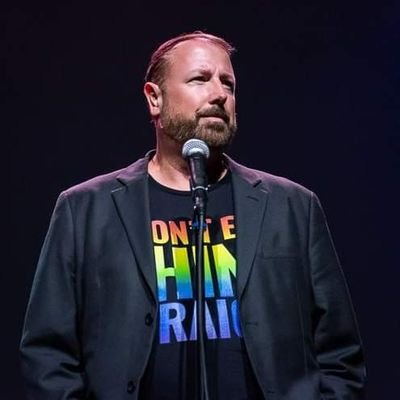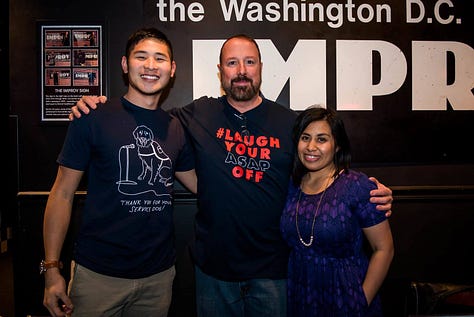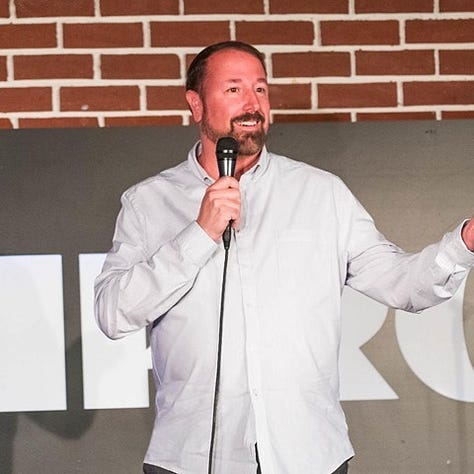He gave and gave and gave — and asked for nothing in return
Remembering Charles McCaffrey, an extraordinary community-builder, veterans advocate, and storyteller



A truism for community groups is that 10 percent of the members do 90 percent of the work that actually builds the community. I’ve heard these people called “weavers” and “cultivators” and “civic catalysts.”
I am still not sure what to call them. I am pretty sure it doesn’t matter. But I am certain that, for the Armed Services Arts Partnership (ASAP), Charles McCaffrey was one of these people.
I say “Charles was” because Charles passed away last month. His life was an extraordinary work of service, generosity, and creativity in the face of unimaginable loss. His death has left a larger-than-life-shaped crater in the ASAP community. And, for me, the circumstances of his life and death have surfaced a deep-seated anger — both at myself for missing the nature of Charles’ “aloneness” and at a system where distant elites make decisions and regular people deal with the consequences.
But I want to start with Charles’ life, because Charles’ life was extraordinary. I’m not talking big flashy extraordinary. I’m talking the extraordinary defined by small acts of goodness and grace, consistently over time.
I first met Charles at one of ASAP’s veterans’ open mics at Dog Tag Bakery. He showed up as a ticketed guest, bought one of our t-shirts, and then, without prompting, proceeded to step into full volunteer mode — setting up the space before the show, welcoming guests when the show began, and helping us break down after. (This doesn’t typically happen).
“Who the heck is this guy?” I wondered.
I wouldn’t have to wonder long. Charles followed up immediately after the show to formally introduce himself. He was a Navy Veteran who now ran the Veteran Business Outreach Centers for the Small Business Administration (SBA). He was inspired by what we were doing with ASAP, and he wanted to help however he could.
He was also a man of his word. He showed up to volunteer at our next show. And the next show. And then the one after that. He started posting about our programming and performances nearly every week on LinkedIn. He even made a point of mentioning ASAP in every small business training workshop he hosted for SBA.
Charles quickly became a one-man advocacy arm for our fledgling nonprofit. When we began looking at our referral sources for our Washington, DC programs, the top referral category was general “word of mouth,” followed by “Charles McCaffrey” (ahead of the entire Department of Veterans Affairs).
Eventually, Charles realized he couldn’t just refer dozens of people to our programs and volunteer every week. If he was going to be a credible advocate for the arts among his fellow veterans, he needed to participate too. So he referred himself to our programs.
In the fall of 2017, he signed up for our Storytelling 101 course — a seven-week storytelling class culminating with a “Moth” style story for a public audience. If I’ve learned anything from watching now thousands of veterans try out new art forms, some people are just naturals (while others, well, not so much). Charles was a natural storyteller. He was 6’3” with a commanding stage presence, a booming voice, and an innate understanding of story structure.
Charles also had a big story to tell.
He didn’t share it at his graduation show. He didn’t share it at the open mics that followed. He waited a full year. But when he told his story at a show we hosted for the anniversary of September 11th, I came to realize the weight that Charles was carrying beneath his boundless generosity:
“For me, it started at the funeral and spiraled downward from there.
So yeah, the funeral. At the funeral, I was 'allowed' to sit in the front row because I was ‘friends’ with the family.
Military funerals are a funny affair – not funny ‘ha ha’ but funny in a surreal sort of way.
Attend a funeral just about anywhere else in the world and there will be wailing and celebrations and fist fights and drinking and gunfire and fireworks and embraces and protests.
But here in America, we grieve in silence — and people make casseroles. I hate casseroles.
And at a military funeral, your brothers- and sisters-in-arms stand in silence; stone-faced, back straight and chin up — defiant in the face of death and grief and tragedy. We don’t cry in public. I didn’t cry. There were no more tears left. And I wasn’t just stone-faced, I was a stone. An inanimate object — dead inside. That’s not true — I disassociated myself from my surroundings because I knew if I thought about this for even a moment, I would break down bawling, again.
I seemed to pass through the five stages of grief every couple of minutes — denial, anger, bargaining, depression, and acceptance. No, not acceptance, not yet. This had gone on for weeks. See, I had seen the message traffic about the suicide bomber and Brent’s name on the list of casualties a week before his parents were notified. But because it had come across on the classified network, I couldn’t say anything to them.
They had lost their son. I had lost my partner. But in 2004, only one of us could acknowledge our relationship and our loss — and it wasn’t me.”
That night, I learned Charles was gay. That night, I learned Charles’ partner, a Marine named Brent, was killed in action in Iraq. That night, I learned he was not allowed to publicly grieve after losing the love of his life during “Don’t Ask, Don’t Tell.”
People sometimes ask me to pinpoint the source of my disillusionment, particularly with large-scale systems and elite institutions. Most of the time, I can’t. But hearing Charles’ story for the first time was certainly one of those sources. Distant leaders make decisions without accountability; ordinary people deal with the consequences.
Charles would live with the absence of Brent’s death until his last day.
But Charles was never going to allow himself to be defined by the worst thing that happened to him. His response to pain continued to be service.
Over the last five years, he continued to serve his fellow veterans — in vocation, voluntarism, and the spoken word. He became the Director of the Veterans Career Program at Paralyzed Veterans of America and the Chair of the SBA Advisory Committee of Veteran Business Affairs. He continued to volunteer with ASAP, helping as a mentor and instructor for our storytelling classes and workshops. He even went on to deliver an expanded version of his story of loss at Story District’s “Top Shelf,” an annual event at the Lincoln Theatre showcasing DC’s top storytelling performances.
Charles gave and gave and gave to his community of fellow veterans — and asked for nothing in return.
Then, a few weeks ago, Charles just died.1
I don’t know how it happened. I don’t know why it happened. I don’t know what he was thinking in those last moments.
What I know is that Charles’ partner died in a war supported by Senators and Representatives in which their own sons and daughters did not serve. What I know is that Charles could not publicly grieve the death of his partner because of a policy of “Don’t Ask, Don’t Tell.” What I know is that Charles never seriously dated again after Brent’s death. And what I know is that Charles died alone in his apartment — far too soon and with no one to accompany him in his final moments.
I’m still in the angry phase of grief.
I’m angry at myself for not realizing that the shadow side of all of Charles’ service and generosity was an aloneness that followed him until his final moments. I’m angry that Charles could not be accompanied as he grieved — and I’m angry that Charles was not accompanied as he died. I’m angry that the politicians who voted for the Iraq war have still faced no accountability for their decisions while family members and community members continue to bear the consequences. And I’m angry that this dynamic is a feature, not a bug, of our current system of governance.
The week Charles died, I had a phone call with Meghan Ogilvie, a dear friend of his and the CEO of Dog Tag Bakery. What she said on that call continues to haunt me: “I hope he knew just how loved he was. But I don’t think he did.”
What I know is that Charles deserved better.
Those closest to Charles in his final weeks suspect he passed from a sudden illness. At present, this cause of death has yet to be confirmed.






Thank you for a very moving post. May his memory continue to be a blessing, both to those who knew him, and those who are hearing about him through you...
Thank you for sharing; remarkable people like Charles deserve to be known by many. I'm mad too at the ways systems failed him.